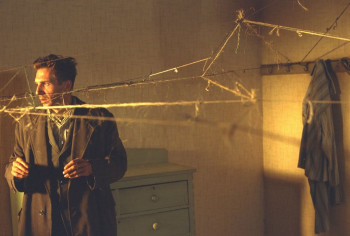Failing Well
Some movies are difficult to criticize. Yes, they’re bad, but they’re well-intentioned and made with a certain amount of skill and ambition. The filmmakers have given the audience credit for being intelligent and open, and viewers ought to re-pay the favor. So it is with May, the low-budget solo debut from writer/director Lucky McKee. The movie is an attempt at a character-driven horror movie, and for that alone it deserves to be seen and praised.

 After watching David Cronenberg’s Spider, I was acutely underwhelmed and disappointed. It could be that the movie’s impact on my first viewing – akin to dropping a light object onto a feather pillow – was a function of overblown expectations. Or it could be that the movie was designed to end with more of a whimper than a bang.
After watching David Cronenberg’s Spider, I was acutely underwhelmed and disappointed. It could be that the movie’s impact on my first viewing – akin to dropping a light object onto a feather pillow – was a function of overblown expectations. Or it could be that the movie was designed to end with more of a whimper than a bang.